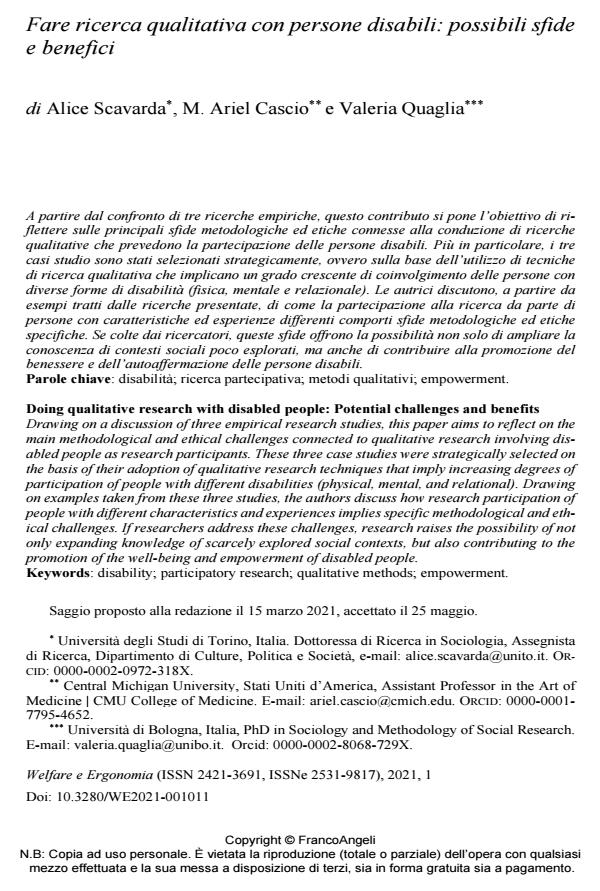Doing qualitative research with disabled people: Potential challenges and benefits
Journal title WELFARE E ERGONOMIA
Author/s Alice Scavarda, M. Ariel Cascio, Valeria Quaglia
Publishing Year 2021 Issue 2021/1
Language Italian Pages 11 P. 117-127 File size 286 KB
DOI 10.3280/WE2021-001011
DOI is like a bar code for intellectual property: to have more infomation
click here
Below, you can see the article first page
If you want to buy this article in PDF format, you can do it, following the instructions to buy download credits

FrancoAngeli is member of Publishers International Linking Association, Inc (PILA), a not-for-profit association which run the CrossRef service enabling links to and from online scholarly content.
Drawing on a discussion of three empirical research studies, this paper aims to reflect on the main methodological and ethical challenges connected to qualitative research involving disa-bled people as research participants. These three case studies were strategically selected on the basis of their adoption of qualitative research techniques that imply increasing degrees of participation of people with different disabilities (physical, mental, and relational). Drawing on examples taken from these three studies, the authors discuss how research participation of people with different characteristics and experiences implies specific methodological and ethi-cal challenges. If researchers address these challenges, research raises the possibility of not only expanding knowledge of scarcely explored social contexts, but also contributing to the promotion of the well-being and empowerment of disabled people.
Keywords: disability; participatory research; qualitative methods; empowerment.
- Cardano M. (2020). Defending qualitative research: design, analysis, and textualization. London: Routledge.
- Cardano M. (2011). La ricerca qualitativa. Bologna: il Mulino.
- Aldridge J. (2014). Participatory Research: Working with Vulnerable Groups in Social Research. London: Sage Publications Limited.
- Cascio M.A. (2017). Operationalizing new biopolitical theory for anthropological inquiry. Anthropological Quarterly, 90(1): 193-224.
- Cascio M.A., Weiss J.A. et Racine E. (2021). Making Autism Research Inclusive by Attending to Intersectionality: a Review of the Research Ethics Literature. Review Journal of Autism and Developmental Disorders, 8: 22-36.
- Charlton I.J. (1998). Nothing About Us Without Us: Disability Oppression and Empowerment. Berkeley, Los Angeles, London: University of California Press.
- Cornwall A. and Jewkes R. (1995). What is participatory research? Social Science & Medicine, 12: 1667-1676.
- Fisher P.A. and Ball T.J. (2005). Balancing empiricism and local cultural knowledge in the design of prevention research. Journal of Urban Health, 2: iii44-iii55.
- Gilliat-Ray S. (2011). ‘Being there’ the experience of shadowing a British Muslim Hospital chaplain. Qualitative Research, 5: 469-486.
- Goffman E. (1963). Stigma: Notes on the Management of Spoiled Identity. New Jersey: Prentice-Hall.
- Johnson C.G. (1982). Risks in the publication of fieldwork. In: Sieber J., a cura di (1982). The Ethics of Social Research: Fieldwork, Regulation, and Publication. New York, NY: Springer, pp. 71-91.
- Mactavish J.B., Mahon M.J. and Lutfiyya Z.M. (2000). “I can speak for myself”: Involving individuals with intellectual disabilities as research participants. Mental retardation, 3: 216-227.
- Maguire P. (1987). Doing Participatory Research: A Feminist Approach. Amherst, Massachusetts: University of Massachusetts.
- Oliver M. (1992). Changing the Social Relations of research Production? Disability, Handicap & Society, 2: 101-114.
- Oliver M. (1996). Understanding Disability. From Theory to Practice. Palgrave: London.
- Quinlan E. (2008). Conspicuous invisibility: Shadowing as a data collection strategy. Qualitative Inquiry, 8: 1480-1499.
- Reeve D. (2002). Negotiating psycho-emotional dimensions of disability and their influence on identity constructions. Disability & Society, 5: 493-508.
- Scavarda A. (2020). «Come pinguini nel deserto». Strategie di resistenza allo stigma di famiglie con figli autistici e con trisomia 21. Rassegna Italiana di Sociologia, 61(3): 537-561.
- Scavarda A. (2017). L’illusione di non esserci. Aspetti metodologici nell’uso dello shadowing nella ricerca sociale. The Lab’s Quarterly. Il trimestrale del laboratorio, 1: 93-111.
- Tandon R. (2005). Participatory Research. Revisiting the Roots. New Delhi: Mosaic Publications.
- Tognetti M., Quaglia V. e Terraneo M. (2021). Il budget di salute come strumento di attivazione per le persone con disabilità. Il contributo della ricerca partecipata. Minority reports. Cultural disability studies, 11/20: 175-194.
- Tognetti M., Terraneo M. e Mazzeo S. (2019). Il budget di salute come strumento di superamento delle forme di segregazione. Minority Reports. Cultural Disability Studies, 9: 161-184.
- Traina I. (2014). Approcci partecipativi ed emancipativi nella ricerca sulla disabilità. Sostegno alla cittadinanza attiva e realizzazione di azioni socialmente innovative. Italian Journal of Disability Studies, 1: 179-202.
Alice Scavarda, M. Ariel Cascio, Valeria Quaglia, Fare ricerca qualitativa con persone disabili: possibili sfide e benefici in "WELFARE E ERGONOMIA" 1/2021, pp 117-127, DOI: 10.3280/WE2021-001011